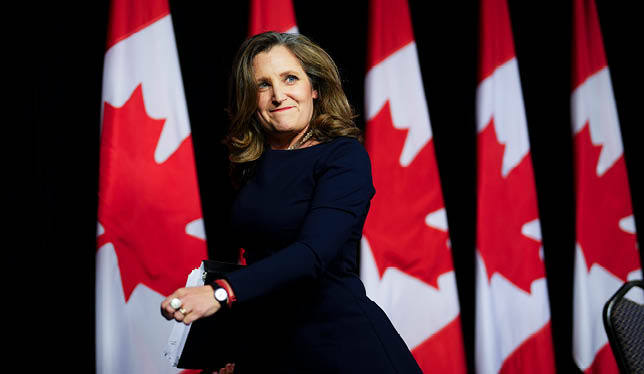Mitacs reopens applications for graduate-student internships in Ontario
The research organization briefly suspended new applications in the province following a significant funding shortage.

Earlier this fall, Jennifer Drake, an associate professor in the department of civil and environmental engineering at Carleton University, heard from one of her industry partners about a research project they had that would be ideal for a graduate student. Dr. Drake, who specializes in stormwater management and green infrastructure, told them there was nothing she could do to help collaborate on the project, even though she knew of plenty of students who needed work and funding.
The problem, she said, came down to an unexpected and temporary funding gap for new projects through Mitacs, a Canadian non-profit organization that offers funding to connect academics with research partners in private industry and government. On Aug. 28, Mitacs, which also funds undergraduate, master’s, PhD and postdoctoral student internships and training across the country, announced it was pausing Ontario applications for all its programs for an indefinite period due to underfunding. Any ongoing program would continue to receive funding, and Mitacs would review and approve any applications sent in before the pause date.
Roughly 10 weeks later, on Nov. 3, Mitacs began informing universities, colleges and other stakeholders that the pause was lifted — it would accept submissions again for the likes of its Accelerate, Elevate and Globalink initiatives. (Its popular Business Strategy Internship is still paused in Ontario and some other provinces too, as it’s a capped program that’s seen high demand.) Following that announcement, the Ontario Ministry of Colleges and Universities committed an additional $10 million to the organization.
“Our government is supporting postsecondary students and partners through experiential learning programs, such as Mitacs, that prepare students with skills and training needed for jobs in an innovative economy,” the ministry offered as a written statement to University Affairs.
“Mitacs is grateful to the Government of Ontario for its ongoing support,” said Mitacs CEO and scientific director John Hepburn, who negotiated with the province to secure the new funds. “We look forward to continuing to partner with the province to drive innovation and economic growth.”
During the nearly two-month hiatus, however, researchers such as Dr. Drake and the organizations they work with, along with students, were left in the dark as to how to proceed.
Mitacs did not issue a formal press release about the application pause, but communicated directly with its partners. Researchers, however, often learned about it through their universities’ research offices and social media. Dr. Drake said she hadn’t heard that Mitacs had reopened graduate-student applications until nearly a week after the fact, which further delayed her ability to recruit a student intern and submit the necessary paperwork.
“There’s no alternative, there’s no other program,” said Dr. Drake of the funding Mitacs provides for industry and government partnerships and the student research jobs that come with them.
Funding for all Mitacs internships come from both the organization and the industry partner — for the Accelerate program, for instance, each stakeholder puts in $7,500. From that, the student researcher is paid $10,000 and the remaining $5,000 goes toward research costs. Students spend time working with both the partner organization and with the professor leading the research project.
Dr. Drake frequently acts as a supervising professor, setting up students with organizations such as conservation authorities to research, for example, how a piece of stormwater equipment is performing. The project helps that organization solve a problem, serves as the foundation for the student’s thesis and constitutes a part of the professor’s lab output.
In its 23-year history, Mitacs has never had to suddenly suspend program intake the way it did this year.
“We had approved, and in the pipeline, enough internships to use up our budget for the entire year,” said Dr. Hepburn of the decision late in the summer to halt funding. “We’ve had a lot more demand in Ontario for our programs.”
Demand began growing across the country for all programs when Mitacs expanded eligibility in 2015, allowing Crown corporations and non-profits to host internships, not just for-profit companies. Then, in 2021, because it got additional funds, Mitacs announced a 50 per cent reduction in the fees industry partners had to pay, with the deal lasting until the end of Mitacs’ fiscal year the following April.
“The combination of the discount plus the knowledge that that program was going to come to an end basically meant that we got flooded with applications,” said Dr. Hepburn.
Mitacs derives its budget from a combination of federal and provincial funds. In April 2021, the federal Ministry of Innovation, Science and Economic Development promised $708 million over five years, covering 75 per cent of its budget. For the remaining 25 per cent, Mitacs looks to the provinces, some of which have committed to stable funding in five-year stints, while others renew year-to-year.
Ontario gave Mitacs $5.5 million in the 2018–19 fiscal year. In recognition of the disruption caused to the program by the pandemic, the province topped up its investment over the next two years to a total of $42 million — this additional money allowed Mitacs to offer the short-term discount to industry partners. In the budget released in this past spring, Ontario’s Mitacs allocation returned to a more customary amount of $7.5 million.
Dr. Hepburn said Mitacs hopes to sign on for a long-term funding commitment from Ontario that will keep pace with demand and allow it to plan better. It also has multi-year commitments from Quebec, Newfoundland and Labrador, Prince Edward Island and New Brunswick while its agreement with Manitoba winds up soon.
Despite the recent financial challenges, Mitacs has no plans to alter how it approves internship applications. “We’ve always had an attitude that if there’s a valid project, we will support it. We don’t like saying no to people,” said Dr. Hepburn. “Putting a pause on things is not something we liked to do, and we prefer to not do it in the future. But this year was an unusual year.”
Featured Jobs
- Psychology - Assistant Professor (Speech-Language Pathology)University of Victoria
- Veterinary Medicine - Faculty Position (Large Animal Internal Medicine) University of Saskatchewan
- Canada Excellence Research Chair in Computational Social Science, AI, and Democracy (Associate or Full Professor)McGill University
- Business – Lecturer or Assistant Professor, 2-year term (Strategic Management) McMaster University
















Post a comment
University Affairs moderates all comments according to the following guidelines. If approved, comments generally appear within one business day. We may republish particularly insightful remarks in our print edition or elsewhere.